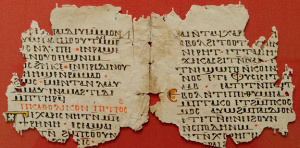Language/Coptic/Vocabulary/Calendar
The Coptic calendar, also called the Alexandrian calendar, is the liturgical calendar of the Coptic Orthodox Church whose faithful live mainly in Egypt, in the diaspora and in Ethiopia (for which it is the calendar used on a daily basis, see Ethiopian calendar). It derives from the calendar of ancient Egypt but is no longer based on lunar cycles and includes adjustments for leap years. It is also still used by the farming populace of Egypt.
Take some time to dive into these other pages after completing this lesson: Say Hello and Greetings in Coptic, Body & People.
Functioning[edit | edit source]
The Coptic calendar finds its starting point in the year of access to power of the Roman tyrant Diocletian. This corresponds to September 11, 284 of the Gregorian calendar. The abbreviation rather than AD (Anno Domini) is AM (Anno Martyrum), "Year of the Martyrs".
Month[edit | edit source]
The Coptic year is made up of 12 months of 30 days, and a month of 5 days (or 6 in leap years). Below the months are given in their traditional English forms (from Ancient Egyptian through Ancient Greek) and with their Arabic names (from Coptic), with the corresponding month in the Gregorian calendar.
- Thoth / توت Tūt (September–October)
- Phaophi / بابه Bāba (October–November)
- Hathyr / هتور Hatūr (November–December)
- Choiak / كياك Kiyāk (December–January)
- Tybi / طوبه Ṭūba (January–February)
- Mecheir / مسرى Misra (February–March)
- Phamenoth / برمهات Baramhāt (March–April)
- Pharmouthi / برموده Baramūda (April–May)
- Pachon / بشنس Bašans (May–June)
- Pauni / بؤنه Baʔūna (June–July)
- Epeiph / أبيب ʔabīb (July–August)
- Mesore / أمشير ʔamšīr (August–September)
- The little month / النسي In-nasī (from September 6 to September 10 or 11)
Leap years[edit | edit source]
Leap years are synchronized with the Julian calendar and are once every four years, with a sixth leap day being added to the Little Month. Due to the Coptic calendar's alignment with the Julian calendar and not the Gregorian calendar, holidays such as Christmas are celebrated on different dates than in the Gregorian calendar: for example Christmas is Koiak 29 or December 25 in the Julian calendar, which lands on January 7 in the Gregorian calendar.
Week[edit | edit source]
The Coptic week has 7 days and begins with Sunday:
- Tkyriaka: Sunday
- Pesnau: Monday
- Pshoment: Tuesday
- Peftoou: Wednesday
- Ptiou: Thursday
- Psoou: Friday
- Psabbaton: Saturday
| No. | Name | Etymology | ||
|---|---|---|---|---|
| Bohairic
Coptic |
Sahidic
Coptic |
Transliteration | ||
| 1 | Ⲑⲱⲟⲩⲧ | Ⲑⲟⲟⲩⲧ | Thōout / Thoout | ḏḥwty: "Thoth", god of wisdom and science |
| 2 | Ⲡⲁⲟⲡⲓ | Ⲡⲁⲱⲡⲉ | Paopi / Paōpe | pꜣ-n-jpt: "Opet festival" |
| 3 | Ⲁⲑⲱⲣ | Ϩⲁⲑⲱⲣ | Athōr / Hathōr | Ḥwt-ḥr: "Hathor", goddess of beauty and love (the land is lush and green) |
| 4 | Ⲭⲟⲓⲁⲕ | Ⲕⲟⲓⲁϩⲕ | Khoiak / Koiahk | kꜣ-ḥr-kꜣ: "Spirit upon spirit," the name of a festival |
| 5 | Ⲧⲱⲃⲓ | Ⲧⲱⲃⲉ | Tōbi / Tōbe | tꜣ-ꜥꜣbt: "The offering" |
| 6 | Ⲙⲉϣⲓⲣ | Ⲙϣⲓⲣ | Meshir / Mshir | mḫjr: The name of a festival, perhaps identical with a type of basket used in that festival |
| 7 | Ⲡⲁⲣⲉⲙϩⲁⲧ | Ⲡⲁⲣⲙϩⲟⲧⲡ | Paremhat / Parmhotp | pꜣ-n-jmnḥtp: "Festival of Amenhotep" |
| 8 | Ⲫⲁⲣⲙⲟⲩⲑⲓ | Ⲡⲁⲣⲙⲟⲩⲧⲉ | Pharmouthi / Parmoute | pꜣ-n-Rnnwtt: "Festival of harvest goddess Renenutet" |
| 9 | Ⲡⲁϣⲟⲛⲥ | Ⲡⲁϣⲟⲛⲥ | Pashons | pꜣ-n-ḫnsw "Festival of Khonsu" |
| 10 | Ⲡⲁⲱⲛⲓ | Ⲡⲁⲱⲛⲉ | Paōni / Paōne | pꜣ-n-jnt: "Valley festival" |
| 11 | Ⲉⲡⲓⲡ | Ⲉⲡⲏⲡ | Epip / Epēp | jpjp: from earlier jpt-ḥmt, meaning "(She who is) Select of Incarnation" |
| 12 | Ⲙⲉⲥⲱⲣⲓ | Ⲙⲉⲥⲱⲣⲏ | Mesōri / Mesōrē | mswt rꜥ: "Birth of Ra" |
| 13 | Ⲡⲓⲕⲟⲩϫⲓ ⲛ̀ⲁ̀ⲃⲟⲧ | Ⲉⲡⲁⲅⲟⲙⲉⲛⲁⲓ | Pikouči enabot / Epagomenai | Bohairic: "The little month"
Sahidic: From Ancient Greek αἱ ἐπαγόμεναι ἡμέραι, “the five intercalated days of the calendar of the Egyptians”, from ἐπάγω “I bring in” |
Sources[edit | edit source]
Other Lessons[edit | edit source]

